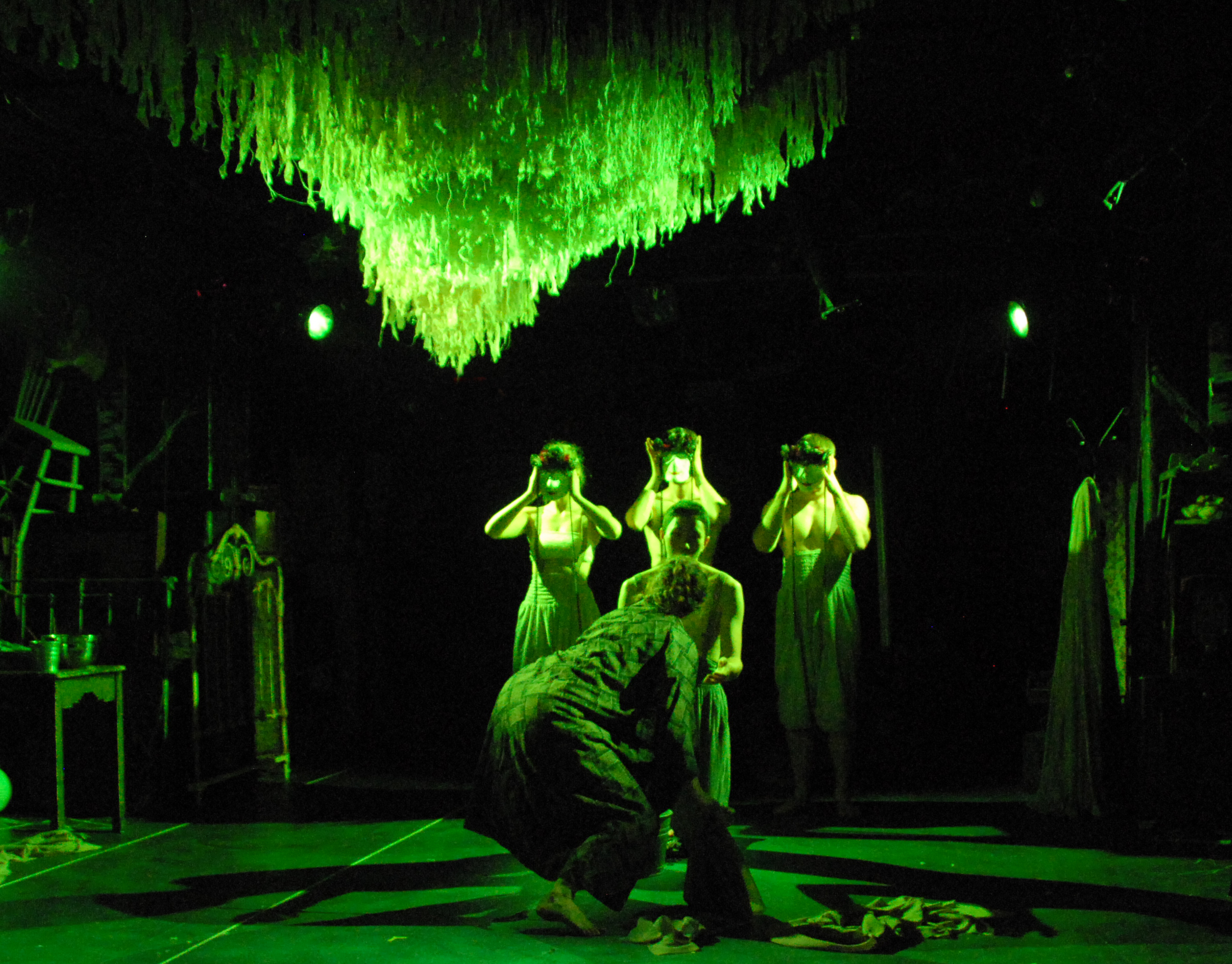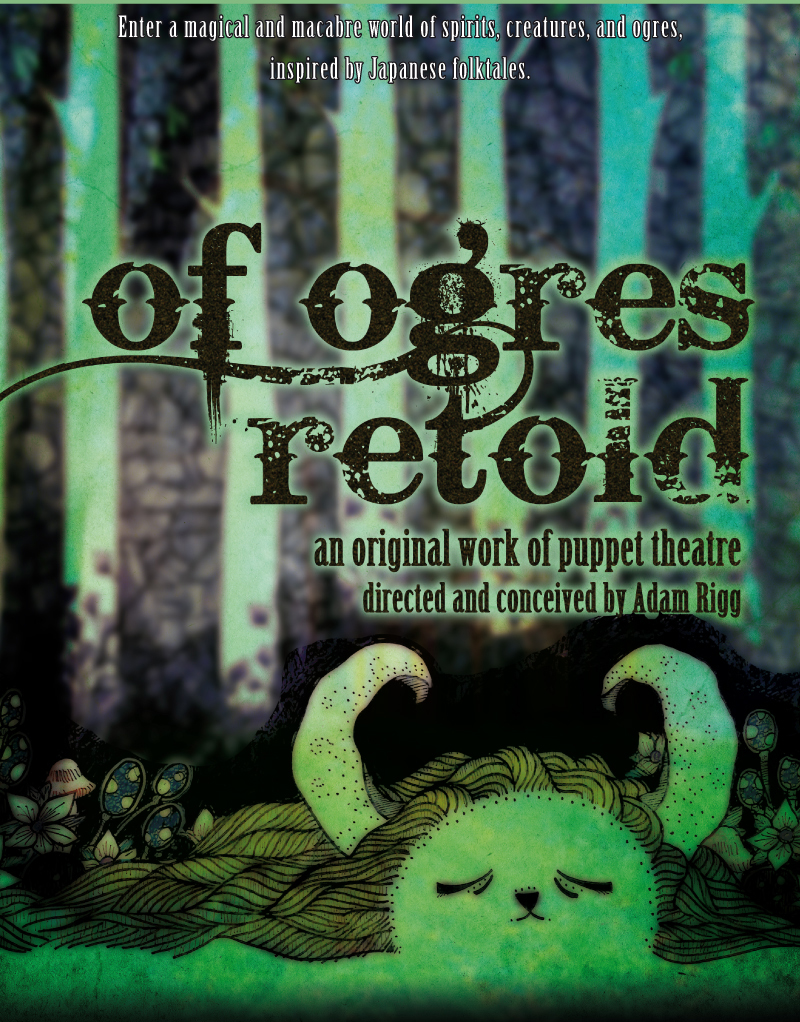Beautiful, mysterious, eerie, surprising, frustrating, poetic, comic, fascinating—Adam Rigg’s Of Ogres Retold, the second play in the Yale Summer Cabaret’s 50 Nights: A Festival of Stories, is all these things and more. Conceived by Rigg and devised by the Ensemble—Josiah Bania, Ethan Heard, Hannah Sorenson, Mickey Theis, Alex Trow—the show offers a succession of vignettes, each a highly stylized use of mime, movement, music, puppets and props, to tell brief stories derived from Japanese folktales involving demons, spirits, and ogres. Without use of dialogue or narration, each story must emerge from repetitive, precisely choreographed actions and interactions. The aura of the show is like a funhouse where transformational enactments are the order of the day. The task for the audience is to derive the narrative thrust of these pieces, each a kind of ritual puzzle. The tonalities of the action at times are hard to infer because Matt Otto’s music—often oddly robotic or processed, at other times ethereal and atmospheric—makes no effort to infuse the action with the kinds of tell-tale emotionalism one finds in film scores.
A perfect example of the fusion of music, movement, and tale is in the story of a woman trying to reach, apparently, a spouse who died. The woman (Alex Trow) crawls nimbly across the floor toward four figures under shrouds, cloaked as well in shadow. The foremost figure (Ethan Heard) is kneeling or crouching, and when the woman gets close enough to grasp the veil, she wrenches it off to reveal, in a sudden spike of bright light and jolting electric static sounds, a ghostly death-mask. This happens three times, and on the fourth try—all to the exact same musical loop—there is a different result that is lovely and melancholic, before swiftly becoming something else.
Many of the stories thrive on repetition, with or without a difference. In another repetitive scene, the entire cast kneels around a low table—two of the men (Josiah Bania and Mickey Theis) pass a bottle. All are engaged in slapping the table at rhythmic intervals, while segments hewn earlier from the tail of a humanoid fish, or merman (Ethan Heard), are passed around; each participant, it seems, is either unwilling to consume or is prevented from consuming a morsel. Eventually, one girl (Trow) takes a bite and enters at once into a kind of twilight world where she engages in repeated clutches involving each member of the company in turn.
Another fascinating ritualistic pas de deux occurs at the start with Mickey Theis and Hannah Sorenson as a couple engaged in some kind of love/hate courtship—after a somewhat erotic if theatrical embrace, Theis inevitably flings Sorenson to the floor and drags her the length of the playing space, then steps over her and continues on his way. She pines; he returns and the same occurs, until . . . things end badly.
Elsewhere there are evocative presentations of a boat at sea, with undulating blue tapestry, of a merman swimming (a puppet moving gracefully behind a blue drape), of twin ogres (Bania and Sorenson) threatening a boat, and an amusing segment in which Heard, in a delightful fantasy of a cook’s outfit, attempts to prepare rice balls, only to be thwarted by one ball that becomes animated. This segment has a kooky charm and is a welcome change from the intensity of the rest of the show. Heard plays the cook with a feel for the exaggerated comedy of silent films (and a very funny slow motion lope), and Trow, as the animator of the rice ball, is superb at mute facial expressions.
Throughout the play, lights (Solomon Weisbard) tend to be muted, bathing the cast in blues and reds, and avoiding strong spots, keeping much of the action shadowy and dreamlike. The costumes (Maria Howard) are wonderful, giving the actors freedom of movement while also creating some impressive effects—the merman costume, for instance, and the many masks. The cast is fluent in their movements and are all lovely to watch.
Expect to be engaged by this unique production, but also to have your sense of what constitutes a story challenged. Without a narrator to set the tone, or dialogue to create characters, the stories must rely on their visual elements in depictions that are dramatic, but also somewhat static, spectacles. Thanks to Adam Rigg's fine flair for design, Of Ogres Retold takes us into a world of dreamlike arabesques, filled with the ambivalent magic of legends, of cautionary tales, and of eerie occurrences. It’s a world of its own making.
Yale Summer Cabaret presents
50 Nights: A Festival of Stories
June 20-August 19
Of Ogres Retold
Conceived and directed by Adam Rigg; devised by the Ensemble: Josiah Bania, Ethan Heard, Hannah Sorenson, Mickey Theis, Alex Trow
July: 11th, 8 pm; 14th, 4:30 pm; 19th, 8 pm; 21st, 2 pm; 27th, 8 pm August: 2nd, 8 pm; 5th, 8 pm; 8th, 8 pm; 11th, 4 pm; 18th, 2 & 8 pm
Photographs courtesy of Yale Summer Cabaret





